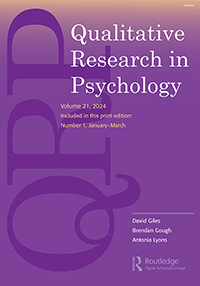新冠肺炎时代的自传与心理学批判。从批判性汽车民族志看伊恩·帕克的心理学
IF 4.4
3区 心理学
Q1 PSYCHOLOGY, MULTIDISCIPLINARY
引用次数: 0
摘要
本文通过批判性汽车民族志对伊恩·帕克的《心理学》进行书评,共有三个目的。首先是对帕克在批判心理学领域的独特贡献进行评估。帕克对心理科学的批判不仅对主流心理学,而且对那些设想自己在批判心理学领域工作的人来说,都是一个关键的挑战:如何不陷入主流心理学和心理学的陷阱?第二个目的是仔细观察帕克对汽车民族志方法论的独特使用。在这里,再次有人认为,帕克对这种方法的挪用不仅是质疑主流心理学有问题领域的理想定位,而且为主体性和社会性开辟了一个不同的视角,应该挑战批判心理学。第三个目标是将这些见解应用于新冠肺炎危机:如果帕克要求我们走出心理情结,“找到许多其他没有心理情结的共同生活方式”,那么主流心理学进入新冠危机,声称我们应该如何分开/共同生活的专家知识,应该正面应对。为了实现这三个目标,作者还使用了适度剂量的自民族志。本文章由计算机程序翻译,如有差异,请以英文原文为准。
Auto-ethnography and psy-critique in Covid times. A book review essay of Ian Parker’s Psychology through Critical Auto-ethnography
ABSTRACT This book review essay of Ian Parker’s Psychology through Critical Auto-ethnography has three objectives. The first is to provide an assessment of Parker’s unique contribution to the field of Critical Psychology. Parker’s critique of the psy-sciences is shown to offer a key challenge not only to mainstream psychology but also to those who envision themselves working in the field of Critical Psychology: how not to relapse in the traps of mainstream psychology and psychologisation? The second objective is to scrutinize Parker’s idiosyncratic use of the methodology of auto-ethnography. Here it is argued, again, that Parker’s appropriation of this method not only is ideally positioned to question the problematic field of mainstream psychology, but also opens up a different perspective on subjectivity and sociality that should challenge Critical Psychology. The third objective is to apply these insights to the Covid crisis: if Parker enjoins us to step outside the psy-complex and “find many other ways to live together without it,” the entry of mainstream psychology into the Covid-debate, claiming expert knowledge on how we should live apart/together, should be confronted head-on. To achieve these three objectives, the author also uses a moderate dose of auto-ethnography.
求助全文
通过发布文献求助,成功后即可免费获取论文全文。
去求助
来源期刊

Qualitative Research in Psychology
PSYCHOLOGY, MULTIDISCIPLINARY-
CiteScore
20.00
自引率
0.50%
发文量
14
期刊介绍:
Qualitative Research in Psychology is an international, peer-reviewed journal that publishes high-quality, original research. It aims to become the primary forum for qualitative researchers in all areas of psychology, including cognitive, social, developmental, educational, clinical, health, and forensic psychology. The journal also welcomes psychologically relevant qualitative research from other disciplines. It seeks innovative and pioneering work that advances the field of qualitative research in psychology.
The journal has published state-of-the-art debates on various research approaches, methods, and analytic techniques, such as discourse analysis, interpretative phenomenological analysis, visual analyses, and online research. It has also explored the role of qualitative research in fields like psychosocial studies and feminist psychology. Additionally, the journal has provided informative articles on ethics, transcription, interviewee recruitment, and has introduced innovative research techniques like photovoice, autoethnography, template analysis, and psychogeography.
While the predominant audience consists of psychology professionals using qualitative research methods in academic, clinical, or occupational settings, the journal has an interdisciplinary focus. It aims to raise awareness of psychology as a social science that encompasses various qualitative approaches.
In summary, Qualitative Research in Psychology is a leading forum for qualitative researchers in psychology. It publishes cutting-edge research, explores different research approaches and techniques, and encourages interdisciplinary collaboration.
 求助内容:
求助内容: 应助结果提醒方式:
应助结果提醒方式:


